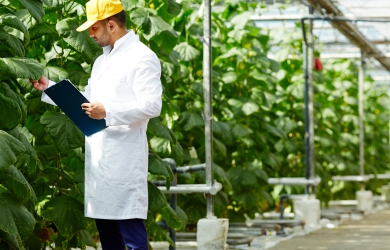Role of Agritech in Helping Agribusinesses Curb Yield Losses

The agriculture industry today is faced with an overwhelming dilemma: how to feed the ever-growing population without putting irreparable strain on the world’s already overburdened resources. In the traditional agricultural model that is based on a predetermined model, there is minimal control over damage and waste. However now, as resources are becoming more scarce, agribusinesses need breakthroughs that will help implement smart solutions to reduce losses without compromising the yield quality.
Common Causes of Yield Losses in Agriculture
Pests remain one of the biggest threats known to farmers. Inventions such as fertilizers and tech-driven farming have helped agribusinesses find ways to reduce losses in previous eras. However, crop pathogens and pests continue to reduce the yield and quality of agricultural production, causing substantial losses and reducing food security at global levels. According to the Food and Agriculture Organization (FAO), the damage wrought by plant pests and diseases reduces about 20-40% of global crop yields every year. The rate of crop yield loss relies on several parameters such as weather conditions along with crop type, growth stage, and protection management.
Postharvest management is also an important stage in agriculture that directly affects crop yield and agribusiness profitability. Postharvest loss includes the food loss across the supply chain from harvesting to its consumption. It can be broadly categorised as quality loss, nutrient loss, weight loss due to spoilage, seed viability loss, and commercial loss.
Environmental pressures such as climate change are making weather conditions less predictable and catastrophic weather events or natural disasters more frequent, resulting in mass crop yield losses. Furthermore, the agriculture industry is facing social pressures including the push for more ethical and sustainable farm practices when it comes to carbon emissions, use of pesticides, chemicals, and water, and standards for farm-animal welfare.
To address these issues poised to further damage the crop yield, agricultural companies are focusing on adopting agritech approaches such as precision farming, farm management software, and digital technology platforms.
Making Smart Use of Data with Precision Farming
Recent agricultural technologies such as IoT-based in-field sensors to measure soil conditions and pH levels help collect a wide range of data in real-time. This data which is visually presented on a digital platform allows farmers to oversee risks and prevent their consequences to treat critical areas and reduce yield losses.
Video-capturing drones is also an emerging agritech solution that can show current conditions of crops and help farmers in taking actions that can impact the growth curve of the crops. With drone technology, farmers can remotely fight infections and pests, conduct crop surveillance, and plan future crops, as well as dispense liquid fertilizers and pesticides at specific areas.
Like many other industries, farmers can leverage big data analytics to reduce yield loss and improve productivity and profitability. For the agriculture industry, big data can provide information on water cycles, rainfall patterns, the location of invasive pests, and pest breeding patterns. With such information, farmers can employ precision farming practices that can ultimately help them bring down yield losses significantly.
Leveraging Farm Management Software to Streamline Operations
Farm management software has recently been gaining significant momentum in the agriculture industry, as it provides farmers with a holistic view of all farm practices. The software comes with predictive features such as weather forecasting and pest detection that can alert farmers to any impending risks and help them have better control over the field.
Through a single platform, farm management software enables efficient crop planning and pest management, the capacity to track activities in real-time, and taking the right decisions for the overall supply chain. Moreover, this software helps determine the timing for all farm activities including the application of fertilizers and pesticides for appropriate pest control measures and enhanced productivity.
Apart from helping farmers determine the most appropriate pest control method to use and fertilizers to apply, farm management software gives insights into when and how to conduct crop rotation. It also helps identify highly productive crops during different seasons that aid farmers in developing an effective calendar to manage crops throughout the season and reduce yield losses.
Improving Distribution and Optimizing the Supply Chain
Once the crops reach their level of maturity, they are ready for the ultimate stage – harvest. Immediately after the crop is harvested, postharvest management begins and lasts until the agriproducts reach the market and finally the customer. This stage is essential to minimise yield loss and preserve crop quality.
The integration of weather forecasts into the agriculture process helps improve the logistics around harvesting and transportation. Weather stations and soil analytics helps, predicts and specifies when the fields will be least affected by the harvesting equipment and workers. These analytics further help in determining various routes to the market which will be affected by upcoming weather changes such as rainfall or high temperature.
As a lot of food waste happens during distribution, agritech companies are focusing on effective supply chain management by streamlining agricultural inventory management, warehouse strategies, and distribution practices. These companies are developing technology-based innovative platforms that capture and store data at each stage, providing increased visibility across the supply chain and enabling farmers to gain immediate access and make informed decisions.
Today, there are numerous factors that are significantly contributing to the deterioration of crops and resulting in poor quality yields. This has made it imperative to make use of agritech and farm management software to reduce yield losses considerably. FarmERP, equipped with advanced software and solutions, can help prevent yield losses across every stage of the agri value chain. Contact us to know more.
